The phoenix and the black knight in Strasbourg – three things to do now
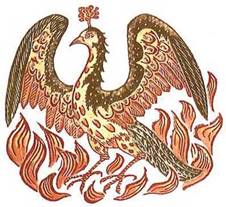
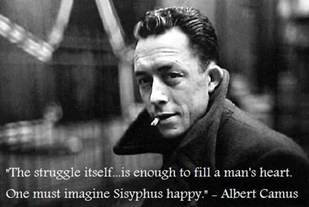
Phoenix rising – Sisyphus struggling
- Taking back the Council of Europe – 2017
- Inside ESI's six-year campaign
- Leonid Slutsky and a Black Knight in Strasbourg
- What next for PACE?
- European values bought and sold
- Serving autocracies?
Dear Friends,
Is the Council of Europe in 2017 a phoenix or Sisyphus? Does it resemble the mythical bird that is cyclically reborn, obtaining new life from the ashes of its predecessor, or the king forced to roll an immense boulder up a hill, only to watch it come back down, again and again? Will it rise again or see its efforts of reform be in vain?
For more than a decade an efficient political machine, large-scale slush funds for corruption and dirty tricks inherited from the KGB have fuelled the effort of the regime in Azerbaijan to capture the Council of Europe and to neutralize the core strategy of the international human-rights movement: "naming and shaming". This effort to paralyse a system of human-rights treaties and human-rights organizations succeeded wonderfully …. until 2017.
Today a broad international coalition of politicians, prosecutors, civil society organisations and investigative journalists is fighting back. They turn a story of decay and corruption into one of political leadership, activism and the power of critical media. A turning-point is in sight. The Parliamentary Assembly of the Council of Europe (PACE) is about to nominate a strong team of commissioners for an unprecedented independent corruption investigation. With this the chances for a serious renewal in Strasbourg increase. From the ashes of scandal, new credibility and commitment may arise.
Taking back the Council of Europe – 2017
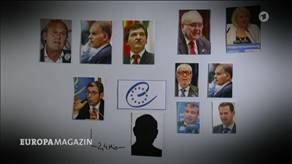
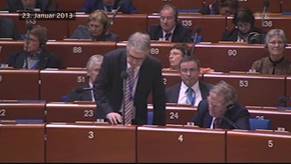
German ARD – Swiss SFR on the drama in Strasbourg
2017 has seen unprecedented activism to restore the credibility of the Council of Europe. While the full background story remains to be told, some of the highlights are clear:
On 20 January, the world's leading anti-corruption NGO, Transparency International, publishes an unprecedented appeal: "Transparency International and six of its European chapters today called on the three top officials of the Council of Europe to investigate serious allegations of corruption in that organisation, and expressed dismay at the apparent lack of effective internal anti-corruption mechanisms at Europe's most important human rights institution." The same day Amnesty International sends a similar letter to officials in Strasbourg, urging them to act.
On 23 January, the winter session of PACE opens with an appeal by Josette Durrieu (French socialist): "An independent outside investigation must be launched swiftly." Anne Brasseur, a former president of PACE (Luxembourg liberal) warns: "Our credibility is at stake, and human rights in the 47 member countries are also on the line. We simply cannot sweep things under the carpet and turn a blind eye." The leader of the European Conservatives, Ian Liddell-Grainger (UK) warns that "corruption seeps into every part of life … Enough: no more weasely words, and no more 'Oh well, we've got to look at it.'" Soon national delegations from 15 countries - Switzerland, Luxembourg, Denmark, Estonia, Finland, Latvia, Lithuania, Norway, Sweden, Belgium, the Netherlands, France, Germany, Italy and Austria – demand a serious and independent corruption investigation in PACE.
On 25 January, a group of MPs led by Pieter Omtzigt (Dutch, EPP) and Frank Schwabe (German, SPD) submit a strong declaration, soon signed by more than 100 members. They call on PACE to "establish, without delay, an external, fully independent and impartial inquiry into all allegations of improper conduct or corruption that may have sought to influence the work of the Assembly in recent years … [and] ensure that the Assembly's Code of Conduct is strengthened in accordance with international best practice."
On 27 January the Bureau of PACE unanimously agrees "that an independent external investigation needs to be set up to shed light on hidden practices that favour corruption."
On 24 April, the Bureau adopts strong terms of reference for an independent inquiry. One day later, the assembly ratifies this decision.
On 29 May, the Bureau nominates three highly respected candidates for this inquiry: a former president of the European Court of Human Rights from the UK, a former ECtHR judge and Ombudsman from Sweden and a leading French anti-terror judge.
In late June 2017 PACE needs to confirm these candidates: Sir Nicolas Bratza, Elisabet Fura and Jean-Louis Bruguière.
Inside ESI's six-year campaign

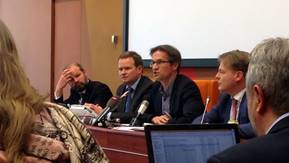
ESI with Pussy Riot and Bill Browder (Oslo 2014) – with Amnesty's John Dalhuisen, Frank Schwabe and Pieter Omtzigt (Strasbourg 2017)
We have watched recent developments with satisfaction and relief. Since 2001 ESI published twenty newsletters on the Council of Europe and caviar diplomacy. We wrote reports, papers, articles and open letters in several languages; we talked to ministers and parliamentarians; we presented findings and recommendations at dozens of conferences and events, in Berlin, Oslo and Stockholm, at the Sakharov Centre in Moscow, the Hudson institute in Washington, and at the Palais de l'Europe in Strasbourg.
Why such an obsessive focus on the Council of Europe? We were convinced from the outset that Europe needs a credible guardian of red lines on basic human rights. It matters hugely, therefore, when such a human rights organisation can be corrupted. This has never been about Azerbaijan only; it has always been about the future of the human rights regime in Europe.
But did any of our efforts make a difference? For many years, things just kept getting worse, both in Strasbourg and in Azerbaijan. In 2013 ESI called on Pedro Agramunt, the rapporteur on and leading apologist of Azerbaijan in PACE at the time, to resign. Instead he was elected leader of the biggest political group in PACE, the European People's Party (EPP). Agramunt remained in this position from 2013 until January 2016, when he became, unopposed, president of PACE. In January 2017, he was re-elected, again unopposed.
It is no surprise, therefore, that Pedro Agramunt remained dismissive of ESI, a pesky NGO which kept suggesting that he personified the moral decline of the institution he now led. And which kept publishing new material every year, for six years:
2011 Jailing the Facebook Generation in Baku – how Azerbaijan "openly mocked" the Council of Europe and the European Court of Human Rights.
2012 Caviar Diplomacy Part One – how "Azerbaijan silenced the Council of Europe."
2013 A Debacle – the political prisoner vote in Strasbourg – how record turnout and a bizarre vote betrayed human rights defenders.
Disgraced – the end of election observation as we know it – how election observation turned into farce.
2014 Chairing the Council of Europe – and jailing dissidents at the same time.
The Mercy of Commodus – Strasbourg as theatre of the absurd. The story of Anar Mammadli and other brave men and women.
2015 The Council of Europe as Dorian Gray – how an institution sold its soul.
2016 Caviar Diplomacy Part Two – corruption as a mortal threat to the Council of Europe.
In early 2017 we stepped up our efforts:
On 18 January, suggesting concrete measures to PACE to investigate corruption: The FIFA of human rights – beyond lip-service on anti-corruption – measures soon picked up by MPs and since adopted by PACE.
On 27 January, while in Strasbourg, pushing for a broad coalition of reformers in the Assembly: Three days that shook Strasbourg – human rights and corruption
On 27 March, calling on PACE to back strong proposals by secretary general Sawicki: Open letter to PACE members: backing Sawicki – how to investigate corruption in Strasbourg
On 21 April, warning that some in PACE, including president Pedro Agramunt and the leader of the liberal group in the assembly, Jordi Xucla, tried to obstruct a serious investigation of corruption with spurious arguments: Merchants of Doubt or investigating Corruption
On 24 April, calling on Pedro Agramunt to resign at a side event with John Dalhuisen (Amnesty International), Frank Schwabe (German MP) and Pieter Omtzigt (Dutch MP) in the Palais de l'Europe.
Finally, more than six years after our first report on the Council of Europe was published, things took a decisive turn in April 2017. But the work of PACE – and of the sunshine coalition of MPs, NGOs and human rights activists – is not yet done.
Leonid Slutsky and a Black Knight in Strasbourg
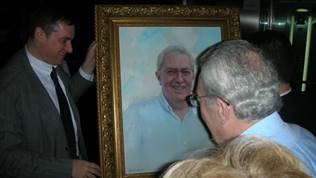
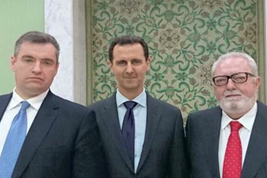
Leonid Slutsky and Pedro Agramunt: exchanging gifts (Valencia) and joint travel (Syria)
On 20 March 2017 Pedro Agramunt and two other prominent members of PACE – Jordi Xucla (Spain, head of the liberal group) and Alain Destexhe (Belgium, liberal) – flew into Damascus on a Russian jet, part of a parliamentary group led by Russian politician Leonid Slutsky. Slutksy and Agramunt knew each other for a long time and had cooperated in PACE as co-rapporteurs on Monaco. In Damascus the group met president Bashar al-Assad, two weeks before a sarin gas attack in Syria's Idlib province.
Slutsky, a leading member of the far-right party of Vladimir Zhirinovsky, celebrated the visit on his Facebook page on 20 March: it was wonderful that Agramunt, the "president of PACE" had now come to Damascus to help highlight the amazing results which Russia had achieve fighting terrorism with Assad in Syria.
In 2007 Slutsky received Chechnyas's highest order (named after Kadyrov, the father of its current president). In 2010 he got the Order of Friendship of Azerbaijan (2010). In 2014 the "Fidelity to Duty" order of the Republic of Crimea followed. In 2014 Slutsky was placed on EU and US sanctions lists for supporting Crimea's annexation.
In April 2014 PACE found that Russia's annexation of Crimea was "in clear contradiction with the Statute of the Council of Europe." It suspended the voting rights of the Russian delegation in a resolution adopted by 145 votes in favour, 21 against and 22 abstentions.
Ever since this decision to suspend their voting rights Russian parliamentarians insisted that this had not only been a serious mistake, but that it was now up to PACE to correct it by removing any possibility to sanction parliamentary delegations in the future. Leonid Slutsky told Izvestiya in October 2016 confidently that he was negotiating on this basis with Agramunt:
"Russia will return [to PACE] only if certain decisions are changed, namely, the denial of the right to vote and other discriminatory actions … These decisions can be adopted in the near future, we are in close contact with the leadership of PACE."
On 10 March 2017, a Russian parliamentary delegation returned to PACE to discuss how to restore relations. Led by Pyotr Tolstoy, who caused controversy in Bulgaria in 2016 by boasting that Moscow could "simply purchase" the country, the Russian delegation demanded in an official statement to the assembly that PACE's rules had to change first:
"We are not begging anyone and we will not beg anyone to restore our delegation in PACE … Russia will conduct dialogue only after the regulation of the assembly is changed so that national delegations cannot be stripped of the right to vote. We strongly hope that our presence will push colleagues towards this choice. In essence you have to decide if you will build Europe with Russia or without Russia."
It was against this background that Slutsky boasted to media in Damascus on 20 March:
"Russia has not left PACE, and the best proof of that is that today, together with us here in Syria, we have the chairman of the Parliamentary Assembly. The Parliamentary Assembly of the Council of Europe slowly but surely returns to common sense with regard to what is happening in Russia, the role of Russia in Europe, the role of Russia in confronting international terrorism here in Syria. And that is why our colleagues are here."
This was also the message Leonid Slutsky communicate to Marine Le Pen in Moscow on 24 March, asking for her support in PACE: "The fact that Europe and European institutions subject us to sanctions and deprive us of rights is absolutely unfounded. We need to work together to turn this not-so-bright page of our relationship."
And Agramunt, Xucla and Destexhe? The president of the assembly later claimed in Saint Petersburg that his trip to Damascus, posing for photos and discussing politics with Leonid Slutsky and president Assad, had been a "private visit." Spanish officials noted that Agramunt had not travelled to Syria on behalf of any Spanish institution.
So who did he represent? Who paid for the trip? Did Agramunt declare the costs anywhere? On 24 April, at the opening of the spring session in Strasbourg, Agramunt responded to critics of this trip to Damascus by claiming that Russians had manipulated him. PACE erupted in derision. Pieter Omtzigt, a leading Dutch Christian Democrat, responded:
"Three members of this Assembly went to visit President Assad, who has killed tens of thousands of citizens. You do not visit such a man to build bridges. Please – the apology was so weak that I would not have accepted it from my children."
Michele Nicoletti (Italy, leader of the Socialist group), called on Agramunt to resign immediately. Kestutis Masiulis (Lithuania, EPP) explained that "In our view, you simply cannot represent us any longer." Roger Gale (UK, conservative) concluded: "I have to say to you, Sir, with great sadness, that your position is no longer tenable." No one spoke out in support of the president. As we wrote on 27 April (Resign! An uprising in Strasbourg):
"Agramont, Xucla and Destexhe represent what is wrong in the Council of Europe today. Their cynical views about human rights, their close relationship to autocrats, procedural games and vision of the role of the Council of Europe have contributed to lead this institution into its biggest credibility crisis in decades."
On 28 April, the Bureau of PACE concluded that it had "no confidence in Pedro Agramunt as President of the Assembly." Henceforth,
"Mr Agramunt is not authorised to undertake any official visits, attend any meetings or make any public statements on behalf of the Assembly in his capacity as President."
It was a decision without precedent, the strongest possible signal of distrust, since impeachment procedures are not foreseen in the PACE statutes. Alas, it is not yet the end of the story.
Six weeks have since passed. Amazingly, Pedro Agramunt refuses to resign. Having lost the confidence of PACE delegations, of its political groups and of its Bureau; unable to speak or undertake official visits, and shunned by European leaders, Agramunt continues to cling to his position. He ignores the assembly, the bureau, the many open questions, telling Spanish media that he is still reflecting on what to do next. Recently he opened the meeting of the PACE Standing Committee in Prague in May.
Agramunt's dramatic fall resembles his rise in its shocking indifference to the damage it is doing to the institution he claims to serve. Unable to travel, to speak and to represent the assembly he turned into Monty Python's black knight who "moves for no man" whatever else happens.

"All right, we call it a draw" (Monty Python's Black Knight)
What next for PACE?
So what should happen next? Three steps are most urgent this June.
(1)
Pedro Agramunt must resign. Without a new PACE president, dedicated to cleaning up corruption, immune to siren calls of Eastern autocrats and dedicated to defend human rights, the Council of Europe cannot emerge from this crisis with its reputation intact. If Agramunt refuses to resign the Spanish Senate and the European leadership of the EPP should push him out.
At the same time PACE should take urgent action in the wake of a declaration issued by the Rules of Procedures, Immunities and Institutional Affairs Committee, unanimously adopted on 27 April, calling for the possibility of impeachment procedures and votes-of-no-confidence.
(2)
The leadership of ALDE (the European liberals) should urgently launch an investigation into the prominent role played by former and current liberal members of PACE, particularly from Belgium and Spain, in defending the interests of autocrats and blocking serious anti-corruption investigations. ALDE leader Guy Verhofstadt, and future prominent Alde member Republique En Marche, should pay closer attention to the way some liberal members undermine basic human rights in Strasbourg. There are a number of prominent liberal members of PACE who can brief them in detail about the problems within their political group.
(3)
Finally, the corruption inquiry about to be launched holds out the realistic hope to clarify what has gone wrong in recent years. Its terms of reference are reassuringly robust:
"to carry out a detailed independent inquiry into the allegations of corruption and fostering of interests made against certain members or former members of the Assembly, to examine the practical functioning of the Assembly in its various activities (including but not restricted to part sessions, committee and sub-committee meetings, rapporteur missions, election observation missions and participation in various events) and its decision-making mechanisms in order to:
– verify whether there are any forms of individual conduct by members of the Assembly or former members of the Assembly which have not respected the provisions of the Code of Conduct for members of the Parliamentary Assembly and other relevant codes of conduct;
– identify any practices contrary to the Assembly's ethical standards, and determine the extent thereof;
– establish, in the light of these findings, whether there is sufficient proof to take action against members or former members of the Assembly, pursuant to paragraphs 19 and 20 of the Code of Conduct for members of the Parliamentary Assembly;
– draw up recommendations on the measures to be implemented to rectify the shortcomings and fill the gaps in the Assembly's ethical framework."
European prosecutors, in France, Italy, the United Kingdom or the Baltic states, should support this effort.
European values bought and sold
The unfolding crisis and looming corruption investigation create an opportunity for investigative journalists around Europe. There is a lot more to discover.
On 7 April, the Organized Crime and Corruption Reporting Project (OCCRP) published an investigative piece by Khadija Ismaylova. It suggests that what is currently known about corruption in Strasbourg may only be the tip of the iceberg of a much bigger scheme. Similar claims have been made before, concerning the role of companies, known for transfers of money from Baku to PACE members, and bank branches, such as Danske Bank's Estonia office.
The crisis also poses a challenge to European think tanks and human rights organisations: to dig deeper and to examine the structural causes of ineffective human rights policies. The Moscow and Warsaw-based Freedom Files Analytical Centre, which recently published "European Values Bought and Sold" might serve as an inspiration – here are two short excerpts of its recent long report:
European Values Bought and Sold:
Spain and PACE
Serving autocracies?
In the end, what is the ultimate measure of impact – of media, think tanks, and the Council of Europe? It is for PACE to appoint rapporteurs that take their job seriously, and who are able and willing to defend human rights where it matters. It is to challenge those who do not take human rights seriously – parliamentarians such as Belgian liberal Alain Destexhe, one of Leonid Slutsky's fellow travellers to Damascus.
As the report "European Values Bought and Sold" by Yuri Dzibladze writes, Alain Destexhe,
"led election observation missions to Azerbaijan in 2008, 2010 and 2013 … endorsing them as free, fair and democratic, and has emerged as one of the key figures protecting the Aliyev regime from criticism …
In 2012, he played a central role in the Azerbaijan energy event, hosted by the European Parliament and initiated by OCAZ, Suleymanov's outlet. [ESI: Elkhan Sulyemanov, PACE member, paid former PACE member Luca Volonte huge sums of money in 2012-2014]
In the same year, together with Suleymanov, he presented a book on Belgian-Azerbaijani relations in Belgian MFA. In 2013, he brought the 10th annual conference of the Parliamentary Network of the World Bank and the IMF to Baku. It was the first "east of Europe" destination of the conference, bringing the most important officials to Baku …
Alain Destexhe's position on political prisoners in Azerbaijan and on his mandate as the rapporteur on Azerbaijan is quite clear from his recent statements. During his latest visit to Baku, Alain Destexhe met on 9 February 2017 with leading Azerbaijani independent journalist and former political prisoner Khadija Ismayilova, among other interlocutors.
According to Ms. Ismayilova's account of the meeting, from the very beginning Alain Destexhe "said he did not want to get into the political prisoners issue because there are arguments on the number of those. He also said he does not want any examples as he has heard too many already". Since Mr. Destexhe received the mandate of the rapporteur on Azerbaijan, "he visited the country to attend Formula 1 and to give positive assessment to the rigged referendum in 2016. He keeps saying that there are no proofs of elections being rigged. My understanding is that Azerbaijan needs special rapporteur on political prisoners, who will work with various lists and define PACE's position on the issue. Alain Destexhe is not going to address this issue," concludes Ms. Ismayilova …
Members of the Working Group for drawing up a single list of political prisoners appealed in January 2017 to PACE to appoint a new rapporteur on political prisoners in Azerbaijan. They pointed out that Alain Destexhe, appointed on 7 March, 2016 to assess the human rights situation in Azerbaijan, did not work on his mandate, shied away from cooperation with civil society representatives and human rights defenders, and did not come into the country in the framework of the mandate.Destexhe will have to produce a report and present it to the Committee by June 2017 when the term of this mandate ends."
It now seems as if there will be no report after all. And yet, there is certainly no shortage of issues to write about. Just recently, on 29 May, journalist Afgan Mukhtarli, was abducted from Tbilisi and taken across the border to Azerbaijan, beaten and with a sack over his head. There he was charged with illegal border crossing, resisting police, and smuggling, and sentenced to 3 months in pretrial detention. On 3 June a member of the NIDA youth movement, journalist Nijat Amiraslanov, was brought to a court while serving 30 days of detention. He was missing all front teeth and had a paralysed arm. Meanwhile the former head of the Council of Europe's School of Politics in Baku, Ilgar Mammadov, remains in jail since early 2013.
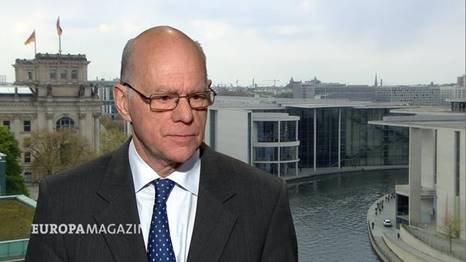
"Devastating": the president of the Bundestag on the Council of Europe
On 30 April German public television ARD aired: "Europarat: Parlamentarier im Dienst von Autokraten?" ("Council of Europe: parliamentarians in the service of autocrats?"). It featured an interview with Norbert Lammert (CDU), the president of the German Bundestag, who explained that a scheduled meeting he had with Pedro Agramunt "will not now take place as foreseen." He referred to the crisis in the Council of Europe as "devastating."
In December 2016, we concluded a report with a reference to the origins of the Council of Europe: it "was created as a club of democracies, led by politicians aware of Europe's autocratic past, conscious of threats to the rule of law, determined to affirm human rights against external and internal opponents. It is time to recapture this spirit. It is high time to take back the Council of Europe."
This effort has finally begun in earnest. It must not fail.
Yours sincerely,

Gerald Knaus
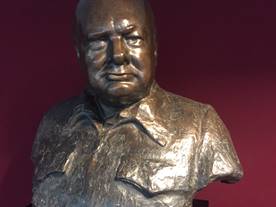

Strasbourg, April 2017
You find all ESI publications on the Council of Europe here: www.esiweb.org/caviardiplomacy
Online clips with ESI presentations on Caviar diplomacy:
Gerald Knaus from Anders Nielsen on Vimeo.
Gerald Knaus, Director of the European Stability Initiative, Germany, held a presentation with the title: The end of shame? Azerbaijan, the Council of Europe and the capture of Europe, at the Sakharov Freedom Award Seminar arranged by the Norwegian Helsinki Committee on 12 November at Litteraturhuset in Oslo.
